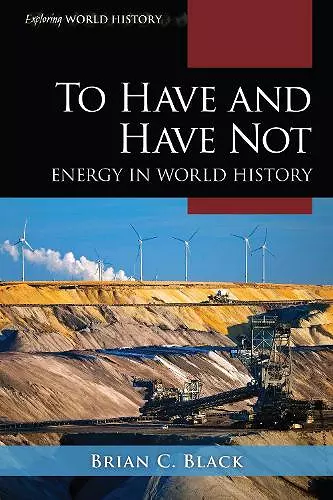To Have and Have Not
Energy in World History
Format:Hardback
Publisher:Rowman & Littlefield
Published:15th May '22
Should be back in stock very soon

This book details the historical journey of energy use, highlighting its impact on climate change and the necessary steps for a sustainable future in To Have and Have Not.
In To Have and Have Not, Brian Black explores the evolution of energy consumption from the Industrial era to the present day. He meticulously outlines how our energy usage has shaped societies and the environment, providing a historical context that highlights the urgent need for change. By examining the patterns of energy use throughout human history, Black emphasizes the critical role energy plays in shaping our modern world, particularly in relation to climate change.
The book contextualizes global history through the lens of the Anthropocene, tracing the significant periods of industrialization and their impact on our current energy landscape. Black's insights reveal how our past decisions regarding energy consumption have led us to the present crisis, urging readers to consider the implications of their energy choices. As a leading scholar in the field, his work is a vital contribution to both environmental and energy history.
To Have and Have Not invites readers to follow the dynamic relationship between humanity and energy, from the industrial revolution to contemporary challenges posed by climate change. Black discusses the potential of renewable resources and the necessary steps we must take to ensure a sustainable future. This important book not only educates but also inspires action towards a more responsible approach to energy consumption.
Reviews/Endorsements:
[Reviews for his last book, Crude Reality:
This engaging and thought-provoking book directs readers’ attention to the vital role that
petroleum occupies in today’s global economy and geopolitical arena. Brian C. Black has done
a masterful job of explaining a complex topic. . . . His conclusions are hard to ignore; the
global society depends on fossil fuels at a time when the world’s peak production of petroleum
has likely already occurred. . . . Essential.” —Choice
“Stands out . . . for Black’s skillful incorporation of environmental and cultural history into
the more standard narratives focusing on the geopolitics of state and corporate development
of global oil resources. . . . Black also makes an important and highly original . . . contribution
by analyzing oil itself as a ‘critical actor, capable of shaping an entire way of life.’ . . . Regardless
of precisely how much oil may be left, though, Black’s insightful book demonstrates that other
‘crude realities’ like environmental damage and global warming will likely favor those nations
that move beyond oil and pioneer the cleaner alternative energy technologies of the future.”
—Journal of World History
“Black . . . has made a most valuable contribution with this long history of oil from the
classical world until today. The work is informative and useful, with a quantity of details
rarely to be found in a single work. . . . The book is well written and always clear and easy to
understand. It [makes] for worthwhile, fruitful reading enriched by many good photos.”
—Global Environmental Politics
“Not since Daniel Yergin’s book, The Prize, has there been a synthetic account that grapples so
thoroughly with the transformative effect of oil in world history. . . . Black . . . [provides] a . . . more
condensed and readable account with a bolder and clearer analytical framework that offers an
accessible entrée to the subject for non-experts of energy history and for scholars alike. . . . Black
crosses national borders and moves swiftly over 250 years of industry development to present
a story in which oil stars initially as ‘black goo’ but transforms over time with the aid of human
accomplices into a powerful actor that drastically alters the world’s climate.”
—Environmental History
- Winner of Outstanding Academic Title 2023
ISBN: 9781538105030
Dimensions: 236mm x 161mm x 25mm
Weight: 585g
310 pages